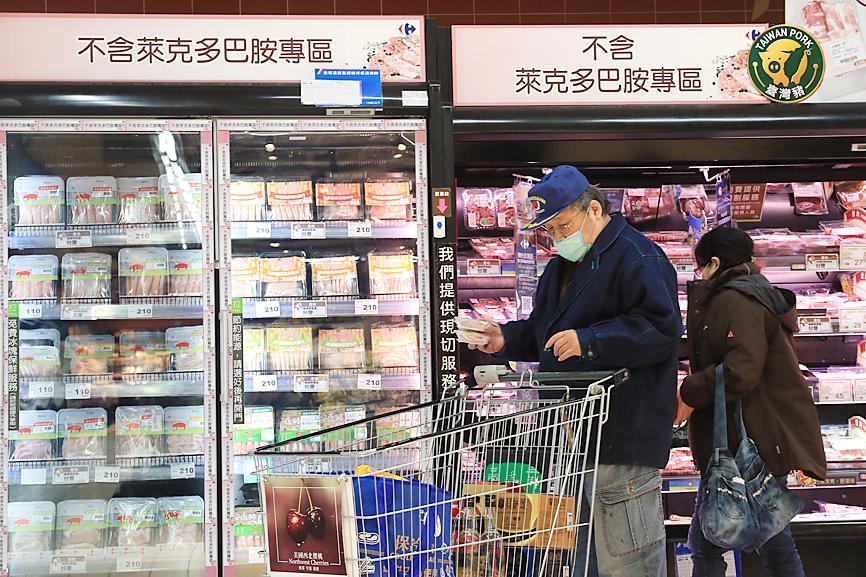Allowing the importation of pork with ractopamine residue is a trade matter, not a safety issue, an Executive Yuan official said yesterday, adding that no health problems have been reported since the ban was lifted.
The official, speaking on condition of anonymity, made the remarks ahead of the Dec. 18 referendum, which includes a question asking voters if they agree that the government should ban the importation of pork products containing ractopamine residue.
The Democratic Progressive Party (DPP) is urging the public to vote “no” on the referendum question, which was initiated by Chinese Nationalist Party (KMT) Legislator Lin Wei-chou (林為洲).

Photo: CNA
The official said that 109 countries allow imports of pork and beef containing safe levels of ractopamine residue, including Japan and the 10 other members of the Comprehensive and Progressive Agreement for Trans-Pacific Partnership (CPTPP).
No health problems have been reported since Taiwan nine years ago allowed the importation of beef containing safe levels of ractopamine residue, the official said, adding that the issue is a trade matter in which Taiwan must reciprocate in bilateral trade with other countries.
If Taiwan does not follow international rules, based on science and safety standards, it could face problems joining the CPTPP and other regional trade organizations, the official said.
DPP Legislator Wang Ting-yu (王定宇) on Friday wrote on Facebook that a Taichung City Government Web site, which shows the results of ractopamine testing, listed only beef products as containing the substance, the importation of which began under former president Ma Ying-jeou (馬英九) of the KMT.
“Just in Taichung, tests found that 70 shops had beef products with ractopamine at levels within international safety standards. This proves that it is not a food safety issue. It is more important to open up for beef and pork imports with safe levels of ractopamine,” Wang wrote. “This way we can secure more favorable terms for our export economy, while helping Taiwan join the CPTPP and bolster Taiwan-US relations.”
On the other hand, KMT Legislator Chiang Wan-an (蔣萬安) yesterday launched a campaign in Taipei titled “Food Safety First,” in which he said that 60.9 percent of Taiwanese opposed importing “pork containing ractopamine” in a survey by Apollo Co.
Sixty-six percent of respondents said they would vote in the referendum, and 86.5 percent said that clear labeling for “pork containing ractopamine” is needed, he said.
“These numbers show the public’s concern for food safety. They have no faith in the government’s current measures. People are also angry at the ruling party for misleading them in painting opposition to ‘ractopamine pork’ as opposition to ‘US pork,’” he said.

Chinese Nationalist Party (KMT) Chairman Eric Chu (朱立倫), spokeswoman Yang Chih-yu (楊智伃) and Legislator Hsieh Lung-chieh (謝龍介) would be summoned by police for questioning for leading an illegal assembly on Thursday evening last week, Minister of the Interior Liu Shyh-fang (劉世芳) said today. The three KMT officials led an assembly outside the Taipei City Prosecutors’ Office, a restricted area where public assembly is not allowed, protesting the questioning of several KMT staff and searches of KMT headquarters and offices in a recall petition forgery case. Chu, Yang and Hsieh are all suspected of contravening the Assembly and Parade Act (集會遊行法) by holding

PRAISE: Japanese visitor Takashi Kubota said the Taiwanese temple architecture images showcased in the AI Art Gallery were the most impressive displays he saw Taiwan does not have an official pavilion at the World Expo in Osaka, Japan, because of its diplomatic predicament, but the government-backed Tech World pavilion is drawing interest with its unique recreations of works by Taiwanese artists. The pavilion features an artificial intelligence (AI)-based art gallery showcasing works of famous Taiwanese artists from the Japanese colonial period using innovative technologies. Among its main simulated displays are Eastern gouache paintings by Chen Chin (陳進), Lin Yu-shan (林玉山) and Kuo Hsueh-hu (郭雪湖), who were the three young Taiwanese painters selected for the East Asian Painting exhibition in 1927. Gouache is a water-based

Taiwan would welcome the return of Honduras as a diplomatic ally if its next president decides to make such a move, Minister of Foreign Affairs Lin Chia-lung (林佳龍) said yesterday. “Of course, we would welcome Honduras if they want to restore diplomatic ties with Taiwan after their elections,” Lin said at a meeting of the legislature’s Foreign Affairs and National Defense Committee, when asked to comment on statements made by two of the three Honduran presidential candidates during the presidential campaign in the Central American country. Taiwan is paying close attention to the region as a whole in the wake of a

OFF-TARGET: More than 30,000 participants were expected to take part in the Games next month, but only 6,550 foreign and 19,400 Taiwanese athletes have registered Taipei city councilors yesterday blasted the organizers of next month’s World Masters Games over sudden timetable and venue changes, which they said have caused thousands of participants to back out of the international sporting event, among other organizational issues. They also cited visa delays and political interference by China as reasons many foreign athletes are requesting refunds for the event, to be held from May 17 to 30. Jointly organized by the Taipei and New Taipei City governments, the games have been rocked by numerous controversies since preparations began in 2020. Taipei City Councilor Lin Yen-feng (林延鳳) said yesterday that new measures by